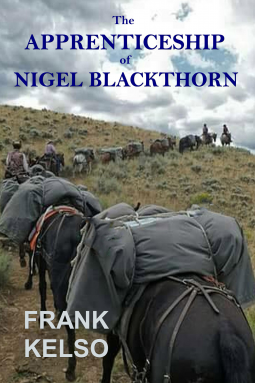
The Apprenticeship of Nigel Blackthorn
by Frank Kelso
This title was previously available on NetGalley and is now archived.
Send NetGalley books directly to your Kindle or Kindle app
1
To read on a Kindle or Kindle app, please add kindle@netgalley.com as an approved email address to receive files in your Amazon account. Click here for step-by-step instructions.
2
Also find your Kindle email address within your Amazon account, and enter it here.
Pub Date Oct 18 2017 | Archive Date Mar 04 2018
Talking about this book? Use #TheApprenticeshipOfNigelBlackthorn #NetGalley. More hashtag tips!
Description
Nigel must choose between entering an orphanage or entering an apprenticeship on a mule train.
To Nigel’s horror, Comanches slaughter Reverend John Blackthorn and his family before his father preaches one word. Nigel survives by following his mother’s instructions to hide in a hollow tree. Nigel prays for God to send help. Instead, Pascal LeBrun, a roaming muleteer, rides to the smoke of the burning wagons to find Nigel, who believed cooking is a woman’s work. Alone, he doesn’t even know how to cook to survive. Pascal solves that problem.
Plump, lazy, and spoiled, Nigel enters an unwelcome new world–work or starve. He finds survival is the way of life on the prairie. Worse yet, English is a little used third language. Riding across the prairie in a wagon bored him. The Comanche attack terrified him. Working dawn to dark on the mule train became drudgery.
Two hundred miles later, when the mule train reaches the first white settlement, Pascal gives Nigel a choice: enter an orphanage, or enter an apprenticeship on the mule train for a piddling wage.
Years later, Nigel wonders if the orphanage would have been easier.
Advance Praise
5-star! Couldn’t stop thinking about what’s next! I do not normally read westerns, this was AMAZING! I became quite curious about how the mule train works and what it looks like when in action!
5-star! Couldn’t stop thinking about what’s next! I do not normally read westerns, this was AMAZING! I became quite curious about how the mule train works and what it looks like when in action!
Available Editions
| ISBN | 9780990602583 |
| PRICE | $2.99 (USD) |
Links
Featured Reviews
 Bonnye Reed F, Reviewer
Bonnye Reed F, Reviewer
This is a very special historical novel, and the first of several following the life of Nigel Blackthorn.
We follow Nigel from June 20, 1853 when he is a boy of 13, through October 1855 when he rejoins Pascal LeBrun as a man in the eyes of the Cheyenne. Born into the family of Methodist Reverend John Blackthorn and his lady wife in Wales, The Blackthorn family leaves England in 1852 at the invitation of the American Board of Missions to convert the heathens to Christ. By June of 1853 the family is on their way to their first posting in west Texas to a Cherokee reservation on the Canadian River, traveling alone as the majority of the wagon train heads north, to Oregon. Their scout gets lost and leaves the family and their driver to await his return after he finds Fort Adobe, which is their destination.
Nigel is the youngest of three children - he just turned 13, and he has an older sister Georgiana, 17, and Eugenia, 15. And he is pretty spoiled by his mother, a little soft and with few if any chores which the girls fuss about often. He is awakened from a nap by the sound of running horses and the screams of his sisters. His mother hands him his shoes, pushes him out the back of the tent, and tells him to hide across the creek, and don't look back. Ever.
He is rescued the next day by a muleskinner, a defrocked Jesuit priest named Pascal LeBrun from France and his mute companion, LaFleur. They find Nigel asleep in the ashes of the camp near his dead mother, and call him Petite Noir. His father is also dead, but the girls are just gone. In the morning they bury his parents, and Noir's life changes 180 degrees. He is at first horrified to be dealing with a papist, and one who curses often, and there will be no spoiling. They travel as fast as the loaded mules can take them, and Noir must carry his own weight - doing the chores he is instructed to, walking and running for part of the day and riding only as he has lessons in French and Spanish. When they reach their first community Nigel has the choice of traveling on with the Frenchman or going to an orphanage - an option he does not take, to the great relief of Pascal, as the local orphanage is a very bad one.
On the trail he learns about some of the things that can hurt him - rattlesnakes and gopher holes, scorpions, poison waterholes, dry waterholes, wolves and cougars and bad men and hostile indians. And every night he says prayers for his parents and his missing sisters, as he had promised his mom he would do, and to never look back. Not anymore.
They winter at a ranch in Mexico where Nigel learns many things he will need as an adult, and head back north to begin hauling trade goods and essentials from the well traveled Santa Fe Trail to more remote communities. The face of transporting goods is changing, as the railroad is coming in, and many places are accessible now to wagon and cart, which is a much simpler way of supplying forts and communities. Pascal is changing the way he thinks as well. But as they travel northon what might be the last mule train, there is a great deal of unrest among the southern Indian tribes, and he fears for Nigel's safety. Pretty much against his will, they leave him with a group of Cheyenne who are personal friends of Pascal and his scout, Philippe, with plans to gather him back up on their way south to winter in Mexico.
Nigel is a spoiled thirteen year old boy whose mother favors him. He doesn't do chores, just lazes around. His family is from Wales and they are coming over to the states to convert the Indians. It didn't turn out any better than it did for the Whitman family in Washington. The Indians slaughter them and the only reason Nigel makes it because he hides...
BooksGoSocial and Net Galley let me read this book for review (thank you). It has been published so you can buy a copy now.
Since Nigel can't even cook for himself, he's in bad shape. When he finds both his parents dead, the wagon burned and his sisters missing, he has no idea what to do. When he hears horses, he's afraid the Indians are returning but it's a muleskinner. He and his partner take Nigel with them because he'd die on the prairie. When they get to town, they consider leaving him at the orphanage but it's so awful they decide to keep him.
Nigel begins by asking to ride a horse. He's told he can walk. He does get to ride a bit but he's not allowed to be lazy. If he doesn't do what he's told, he doesn't eat. It might only be beans but he's a growing boy and he's always hungry. Next up, he's told to run instead of walking. He's also taught how to cook and how to set up camp. He's toughening up and getting in shape but then the muleskinner throws him another curve. He says he has to stay with the Indians while he makes a long trip with the mules. Nigel hates Indians! Pascal tells him not all Indians are his enemy.
This is a tale of a young man coming of age with the help of Pascal, a defrocked priest, and an Indian family. He learns a lot from everyone even if he's tired of being given tasks and he even finds out about sex while with the Indians. He almost dies of mortification as his Indian mother explains birth control to him.
I like Nigel. He's tough and won't give up. There will be more in this series. This is the authentic old west in a story told well.
 Educator 444943
Educator 444943
This is a story about a young boy from Wales who is taken to the American West by his father who wishes to bring Christianity to the 'heathens.' The family are attacked and young Nigel is left alone. He is adopted by a man who runs long mule trains to carry cargo across the expanses between settlements, the story now follows Nigel into this alien and harsh life.
This book is surprisingly detailed and unique. It is a combination of a coming-of-age story and a historical western.
For me the book's strengths lie in the characterisation and the setting. The people Nigel has to rely on are rough and appear unreliable to him and yet they are helping him to learn to survive. The strongest part of the narrative is the last quarter or so when Nigel is living with the Cheyenne. This is where the characters and the pace pick up and the development of Nigel is greatest. There is a great deal of detail about life with the People and the reasons why they live as they do. This part of the story is the best for me. I didn't want this to end and was interested in the other characters within the tribe's community. The detail is meticulous and added to the richness of the life in the tribe's village.. There are few women within the book until we reach the Cheyenne. The attitude towards the women and their roles in the tribal village were very interesting and made a thoughtful contrast to the Victorian attitudes that Nigel had learned were appropriate for his mother and sisters.
The earlier part of the book describes Nigel's life with the mule train. This again is described in great detail - and for me sometimes a little too much detail. Yet it created a sense of repeated daily life that reinforced the strangeness of Nigel's new situation. He is in a harsh environment but is in the early teen years when he is neither man nor child. The description of the country that Nigel moves through is vivid and well-drawn.
Some of the writing was repetitve such as describing that Nigel 'ran' or 'prayed' or that 'the days passed' often at the end of each chapter. This lost impact as it kept being used..
Overall this is a different, very detailed and informed book about the time of the Wild West and survivial there.
For the originality and breadth of interest in this story I am looking forward to the next part of Nigel's story.




